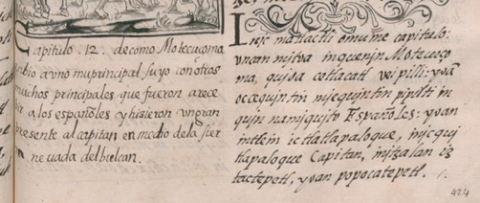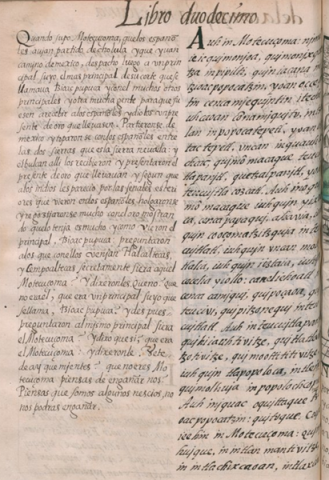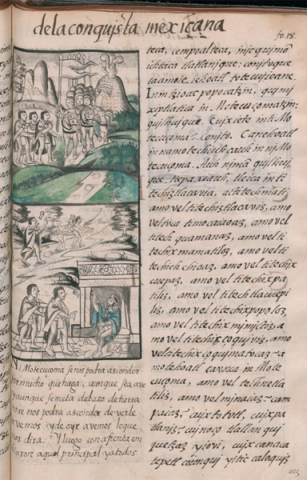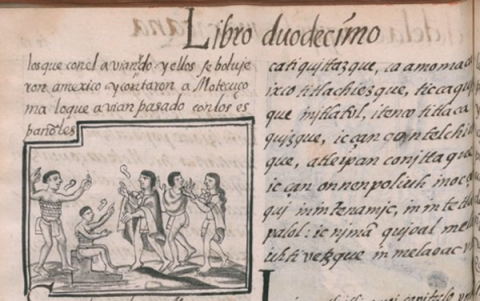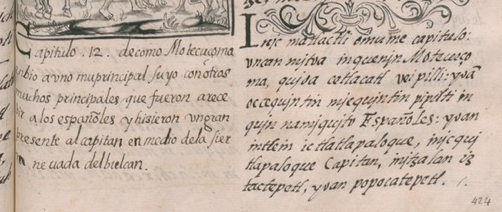 |
[Transcription of the Nahuatl (right-hand column) by James Lockhart:]
[f. 17r., cont.] Inic matlactli omume capitulo: vncan mitoa in quenin Motecuçoma, quioa ce tlacatl vei pilli: yoā oc cequintinmiequintin pipilti in quinnamiquito Españoles: yoan intlein ic tlatlapaloque, inic quitlapaloque Capitan, in itzalan iztactepetl, yoan popocatepetl./.
|
[Translation of the Nahuatl (right-hand column) by James Lockhart:]
Twelfth chapter, where it is said how Moteucçoma sent a great nobleman along with many other noble men to go to meet the Spaniards, and what their gifts of greeting were when they greeted the Captain between Iztactepetl and Popocatepetl.
[Translation of the Spanish (left-hand column) by James Lockhart:]
Chapter Twelve, of how Moteucçoma sent a high leader of his, with many other leaders, who went to receive the Spaniards, and gave a great present to the Captain between the snowy peak and the volcano.
|
[Translation of the Nahuatl into Spanish by Fr. Bernardino de Sahagún; transcription of the Spanish (left-hand column) by James Lockhart:]
[f. 17r., cont.] Capitulo .12. de como Motecuçoma enbio a vno mu* principal suyo con otros muchos principales que fueron a recebir a los españoles y hizieron vn gran presente al capitan en medio de la sierra neuada del** bulcan.
----------
*MU. For "muy."
**DEL. For "y el."
|
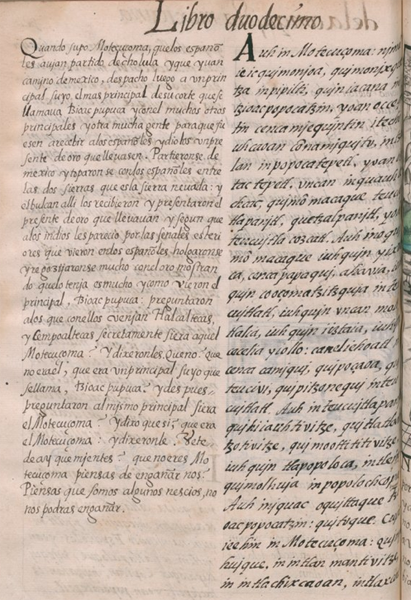 |
[Transcription of the Nahuatl (right-hand column) by James Lockhart:]
[f. 17v.] Auh in Motecuçoma: nimā ie ic quimonioa, quimonixquetza in pipilti, quiniacana in tzioacpopocatzin, yoan oc ceq’ntin cenca miequintin itechiuhcaoan cōnamiquito, intzalan in popocatepetl, yoan iztactepetl, vncan in quauhtechcac, quimōmacaque teucuitlapanitl, quetzalpanitl, yoā teucuitlacozcatl.
Auh in oquimōmacaque iuhquin yixvetzca, cenca papaqui, ahavia, iuhquin cooçomatzitzquia in teucuitlatl, iuhquin vncan motlatlalia, iuhquin iiztaia, iuhqn cecelia yiollo: canel iehoatl in cenca camiqui, quipoçaoa, quiteucivi, quipitzonequi in teucuitlatl. Auh in teucuitlapanitl quihiiauhtivitze, quitlatlavitzotivitze, quimoottititivitze, iuhq̓uin tlapopoloca, in tlein quimolhuia in popolochcopa.
Auh in iquac oquittaque Tzioacpopocatzin: quitoque. Cuix iee hin in Motecuçoma: Quimilhuique, in intlanmantivitze in intlachixcaoan, in tlaxcal
|
[Translation of the Nahuatl (right-hand column) by James Lockhart:]
Thereupon Moteucçoma named and sent the noble men and a great many other agents of his, with Tzihuacpopocatzin as their leader, to go meet [Cortés] between Popocatepetl and Iztactepetl, at Quauhtechcac. They gave [the Spaniards] golden banners, banners of precious feathers, and golden necklaces.
And when they had given the things to them, they seemed to smile, to rejoice and be very happy. Like monkeys they grabbed the gold. It was as though their hearts were put to rest, brightened, freshened. For gold was what they greatly thirsted for; they were gluttonous for it, starved for it, piggishly wanting it. They came lifting up the golden banners, waving them from side to side, showing them to each other. They seemed to babble; what they said to each other was in a babbling tongue.
And when they saw Tzihuacpopocatzin, they said, “Is this one then Moteucçoma?” They said it to the Tlaxcalans
[Translation of the Spanish (left-hand column) by James Lockhart:]
When Moteucçoma learned that the Spaniards had departed from Cholula and were on their way toward Mexico, he immediately dispatched one of his leaders, the most important in his court, called Tzihuacpopoca, and many other leaders with him, and many other people, to go to receive the Spaniards, and he gave them a present of gold to take. They departed from Mexico and came up against the Spaniards between the two mountains, that is, the snowy peak and the volcano.
There they received them and gave them the present of gold that they brought, and according to the external signs that the Indians saw in the Spaniards, it seemed to them that they were pleased and greatly rejoiced over the gold, for they held it in great esteem.
And when they saw the leader Tzihuacpopoca, they secretly asked the Tlaxcalans and Cempohualans who were coming along with them if that was Moteucçoma. They told them no, that it was not him, that it was a leader of his named Tzihuacpopoca.
And afterward they asked the leader himself if he was Moteucçoma, and he said that yes, he was Moteucçoma.
Then they told him, "Go on with you, you're lying. You aren't Moteucçoma. Do you think you can deceive us? Do you think we are a lot of simpletons? You can't deceive us.
|
[Translation of the Nahuatl into Spanish by Fr. Bernardino de Sahagún; transcription of the Spanish (left-hand column) by James Lockhart:]
[f. 17v.] Quando supo Motecuçoma que los españoles auia partido de cholula y que yuan camino de mexico, despacho luego a vn principal suyo el mas principal de su corte que se llamaua tzioacpupuca y con el muchos otros principales y otra mucha gente para que fuesen a recebir a los españoles y diolos vn presente de oro que lleuasen. Partieronse de mexico y toparonse con los españoles entre las dos sierras que es la sierra neuada: y el bulcan.
alli los recibieron y presentaron el presente de oro que lleuauan y segun que a los indios les parecio por las senales esteriores que vieron en los españoles holgaronse y regozijaronse mucho con el oro mostrando que lo tenia es* mucho.
y como vieron el principal, tzioacpupuca: preguntaron a los que con ellos venian Tlalcaltecas,** y Cempoaltecas secretamente si era aquel Motecuçoma? Y dixeronles. Que no! Que no era el, que era vn principal suyo que se llama, tzioacpupuca!
y despues preguntaron al mismo principal si era el Motecuçoma? Y dixo que si! que era el Motecuçoma:
y dixeronle. Vete de ay que mientes! que no eres Motecuçoma piensas de engañarnos? Piensas que somos algunos nescios, no nos podras engañar.
----------
*ES. For "en."
**TLALCALTECAS. For "Tlaxcaltecas."
|
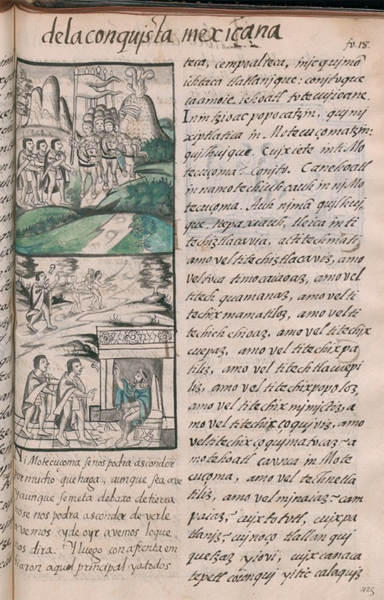 |
[Transcription of the Nahuatl (right-hand column) by James Lockhart:]
[f. 18r.] teca, cempoalteca, inic quimōichtacatlatlanique: conitoque ca amo ie iehoatl totecuiioane. Inin tzioacpopocatzin, quimixiptlatica in Motecuçomatzin:
quilhuique. Cuix ie te in tiMotecuçoma? Conito. Ca nehoatl in namotechiuhcauh in niMotecuçoma.
Auh nimā quilhuique. Nepa xiauh, tleica in titech-iztlacavia, ac titechmati, amo vel titechiztlacaviz, amo vel toca timocaiaoaz, amo vel titechquamanaz, amo vel itechixmamatiloz, amo vel titechichchioaz, amo vel titechixcuepaz, amo vel titechixpatiliz, amo vel titechtlacuepiliz, amo vel titechixpopoloz, amo vel titechixmimictiz, amo vel titechixçoquiviz, amo vel titechixçoquimatocaz! amo tehoatl ca vnca in Motecuçoma, amo vel technetlatiliz, amo vel minaiaz! campa iaz? cuix tototl, cuix patlaniz? cuinoço* tlallan quiquetzaz yiovi, cuix cana ca tepetl coionqui yitic calaquiz
----------
*CUINOÇO. Read "cuix noço."
|
[Translation of the Nahuatl (right-hand column) by James Lockhart:]
and Cempoalans, their lookouts, who came among them, questioning them secretly. They said, “It is not that one, oh our lords. This is Tzihuacpopocatzin, who is representing Moteucçoma.” [The Spaniards] said to him, “Are you then Moteucçoma?” He said, “I am your agent Moteucçoma.”
Then they told him, “Go on with you! Why do you lie to us? What do you take us for? You can’t lie to us, you can’t fool us, <turn our heads>, flatter us, <make faces at us>, trick us, confuse our vision, distort things for us, blind us, dazzle us, throw mud in our eyes, put muddy hands on our faces. It is not you. Moteucçoma exists; he will not be able to hide from us, he will not be able to find refuge. Where will he go? Is he a bird, will he fly? Or will he take an underground route, will he go somewhere into a mountain that is hollow inside?
[Translation of the Spanish (left-hand column) by James Lockhart:]
Nor can Moteucçoma hide himself from us, whatever he should do; though he should be a bird, or though he should go beneath the earth, he will not be able to hide from us. We are going to see him and hear what he tells us."
Then with insults they dismissed that leader and all
|
[Translation of the Nahuatl into Spanish by Fr. Bernardino de Sahagún; transcription of the Spanish (left-hand column) by James Lockhart:]
[f. 18r.] Ni Motecuçoma se nos podra asconder por mucho que haga, aunque sea ave y aunque se meta debaxo de tierra no se nos podra asconder de verle avemos y de oyr avemos lo que nos dira.
Y luego con afrenta embiaron aquel principal y a todos
|
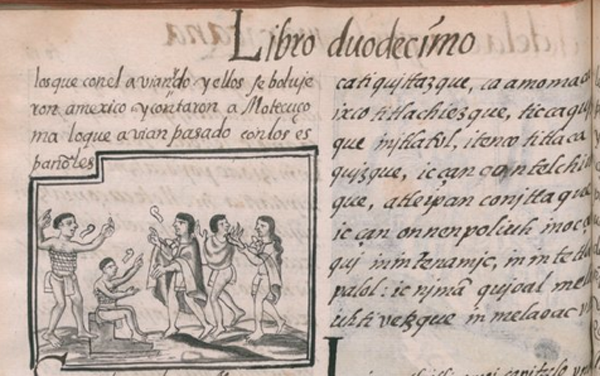 |
[Transcription of the Nahuatl (right-hand column) by James Lockhart:]
[f. 18v.] ca tiquittazque, ca amo maca ixco titlachiezque, ticcaquizque in itlatol, itenco titlacaquizque,
ic çan contelchiuhque, atle ipan conittaque ic çanonnenpoliuh in oc çequi in intenamic, in intetlapalol: ic nimā quioalmelauhtivetzque in melaoac vtli.
|
[Translation of the Nahuatl (right-hand column) by James Lockhart:]
We will see him, we will not fail to gaze on his face and hear his words from his lips."
Therefore they just scorned and disregarded him, and so another of their meetings and greetings came to naught. Then they went straight back the direct way [to Mexico].
[Translation of the Spanish (left-hand column) by James Lockhart:]
who had gone with him, and they returned to Mexico and told Moteucçoma what had happened with the Spaniards.
|
[Translation of the Nahuatl into Spanish by Fr. Bernardino de Sahagún; transcription of the Spanish (left-hand column) by James Lockhart:]
[f. 18v.] los que con el avian ydo y ellos se boluieron a mexico y contaron a Motecuçoma lo que avian pasado con los españoles.
|
